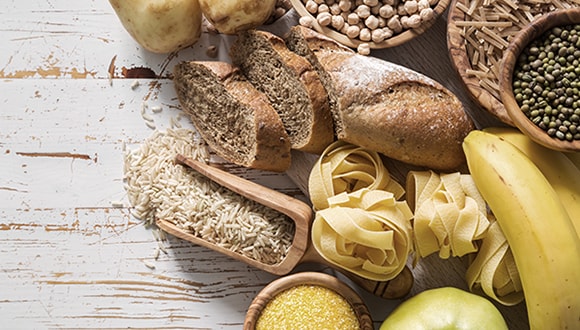Are carbs bad for you?
Carbohydrates get a bad rap – but choosing the right type can actually boost your health and aid weight loss.
Health Agenda magazine
January 2018
Carbohydrates are 1 of the 3 important macronutrients in our diet, the other 2 being fats and proteins. Your body uses most of the carbohydrates you eat to make glucose, which is your body’s main energy source.

Know your carbs
Being able to recognise healthier carbs can help you make better food choices. Dr Alan Barclay, consultant dietitian and research associate at the University of Sydney and co-author of The Good Carbs Cookbook, describes healthier carbs as “foods that are minimally processed, good sources of dietary fibre and have a low glycaemic index”.
Examples include:
- fruit
- vegetables
- legumes like lentils, kidney beans and peas
- nuts and seeds
- whole grains (such as oats, brown rice and barley).
Whole grain foods are more than a source of energy. They’re also an important source of many nutrients. A large study published in 2010 in the Journal of the American Dietetic Association found adults who ate the most whole grains had higher intakes of energy, fibre and polyunsaturated fats. They also ate more of all the vitamins and minerals, with the exception of vitamin B12 and sodium.
In Australia, we eat far too many unhealthy sources of carbohydrates. On average, 45% of our daily energy comes from carbohydrates, but high-sugar options such as cakes, muffins and confectionary are over-represented, according to the 2011–12 Australian Health Survey. And many of the grain foods eaten are highly refined as well as low in fibre and other nutrients compared to the recommended wholegrain foods, which are packed full of nutrition.
Can carbs improve your health?
Carbohydrates are often accused of contributing to weight gain, but the right kinds of carbohydrates can actually help prevent weight gain and even aid in weight loss. A study published in the American Journal of Clinical Nutrition in 2017 found eating whole grains was associated with weight loss, and their fibre content was cited as a major contributor. The fibre in these carbs helps us to feel full and foods high in fibre are also high in other nutrients, yet lower in kilojoules.
Most of your body’s cells – especially in the brain – use the simple carbohydrate glucose for energy, so your choice of carbohydrates is very important. Research published in JAMA Internal Medicine in 2009 reported that people on a low-carbohydrate diet for a year had more anxiety, depression and anger than people eating a high-carb diet. The reason for this difference could be that carbohydrates help with the production of serotonin in the brain, which is the neurotransmitter that makes us happy.
Carbohydrates can help with memory, too. A 2009 study from Tufts University found that when dieters eliminated carbohydrates from their meals, they performed poorly on memory-based tasks compared to when they reduced only kilojoules, but ate carbohydrates. Cognition skills returned to normal when they ate carbohydrates again.
Choosing the right types of carbohydrates will do your health the world of good. Rather than shun them completely, embrace quality carbs for the variety, taste and aroma they add to your food choices.
Choose your carbs wisely
1. Prioritise fruits and vegetables: All fruits and vegetables contain fibre, but some – such as pear and broccoli – are higher than others. Choose fresh, frozen fruits and vegetables in close to their natural state without added sugar.
2. Pick whole grains: Whole grains (such as whole wheat and brown rice) are better sources of fibre and other important nutrients, such as B vitamins, than refined grains (such as wheat flour and white rice).
3. Lead with legumes: Legumes include beans, peas and lentils. These are versatile and nutritious foods and are low in fat and high in fibre and contain many important vitamins and minerals.
4. Eat less added sugar: If you have a well-balanced diet, a small amount of added sugar isn’t harmful, but there’s no health advantage to consuming it. Avoid high-sugar foods with no nutritional value, like cookies and soft drinks.
Related articles
6 COMMON DIET MYTHS, BUSTED
When it comes to diet and nutrition, there are plenty of misconceptions out there. We sort fact from fiction to help you stay on track.
HEALTHY DIET OR FOOD FAD?
If you’re confused about the health benefits of the latest popular diets here’s what you need to know.
THE FACTS ABOUT SUGAR
Sugar has been getting a bad rap lately. Is it really that bad? How much is ok? We look beyond the headlines to the science of sugar.
THE DIRT ON CLEAN EATING
We see the term 'clean eating' everywhere – in celebrity interviews, Instagrammed breakfasts, podcasts and diet books – but what does it mean, and is it healthy?